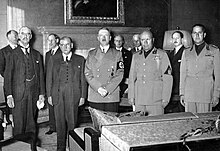
The lesson of Munich, in international relations, refers to the appeasement of Adolf Hitler at the Munich Conference in September 1938. To avoid war, France and the United Kingdom permitted Nazi Germany to incorporate the Sudetenland. Earlier acts of appeasement included the Allied inaction towards the remilitarization of the Rhineland and the Anschluss of Austria, while subsequent ones included inaction to the First Vienna Award, the annexation of the remainder of Czech Lands to form the Protectorate of Bohemia and Moravia, as well as the 1939 German ultimatum to Lithuania forcing it to cede the Klaipėda Region.
The policy of appeasement underestimated Hitler's ambitions by believing that enough concessions would secure a lasting peace.[1] Today, the agreement is widely regarded as a failed act of appeasement toward Germany,[2] and a diplomatic triumph for Hitler. It facilitated the German takeover of Czechoslovakia and caused Hitler to believe that the Western Allies would not risk war over Poland the following year, an assessment openly expressed in his famous quote: "I saw my enemies in Munich, and they are worms", which proved partially correct in light of the popularity of the slogan "Why Die for Danzig?" in France and, crucially, the events known as the Phoney War.
- ^ Cite error: The named reference
wishfulwas invoked but never defined (see the help page). - ^ "Munich Agreement". Encyclopaedia Britannica. Retrieved 6 August 2018.
© MMXXIII Rich X Search. We shall prevail. All rights reserved. Rich X Search
